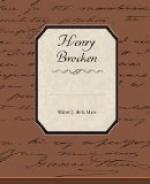“Well,” I said, “Jane Eyre is left.”
She pressed her lips together. “I see,” she said brightly. “But then, was I not detestable too? so stubborn, so wilful, so demented, so—vain?”
“You were vain,” I answered, “because—”
“Well?” she said, and the melody died out, and the lower voices of her music complained softly on.
“For a barrier,” I answered.
“A barrier?” she cried.
“Why, yes,” I said, “a barrier against cant, and flummery, and coldness, and pride, and against—why, against your own vanity too.”
“That’s really very clever—penetrating,” she said; “and I really desired to know, not because I did not know already, but to know I knew all. You are a perspicacious observer, Mr. Brocken; and to be that is to be alive in a world of the moribund. But then too how high one must soar at times; for one must ever condescend in order to observe faithfully. At any rate, to observe all one must range at an altitude above all.”
“And so,” I said, “you have taken your praise from me—”
“But you are a man, and I a woman: we look with differing eyes, each sex to the other, and perceive by contrast. Else—why, how else could you forgive my presumption? He sees me as an eagle sees the creeping tortoise. I see him as the moon the sun, never weary of gazing. I borrow his radiance to observe him by. But I weary you with my garrulous tongue.... Have you no plan at all in your journey? ’Tis not the dangers, but to me the endless restlessness of such a venture—that ’Oh, where shall wisdom be found?’... Will you not pause?—stay with us a few days to consider again this rash journey? To each his world: it is surely perilous to transgress its fixed boundaries.”
“Who knows?” I cried, rather arrogantly perhaps. “The sorcery that lured me hither may carry me as lightly back. But I have tasted honey and covet the hive.”
She glanced sidelong at me with that stealthy gravity that lay under all her lightness.
“That delicious Rosinante!” she exclaimed softly.... “And I really believe too I must be the honey—or is it Mr. Rochester? Ah! Mr. Brocken, they call it wasp-honey when it is so bitter that it blisters the lips.” She talked on gaily, as if she had forgotten I was but a stranger until now. Yet none the less she perceived presently my eyes ever and again fixed upon the little brooch of faintest gold hair at her throat, and flinched and paled, playing on in silence.
“Take the whole past,” she continued abruptly, “spread it out before you, with all its just defeats, all its broken faith, and overweening hopes, its beauty, and fear, and love, and its loss—its loss; then turn and say: this, this only, this duller heart, these duller eyes, this contumacious spirit is all that is left—myself. Oh! who could wish to one so dear a destiny so dark?” She rose hastily from the piano. “Did I hear Mr. Rochester’s step by the window?” she said.




